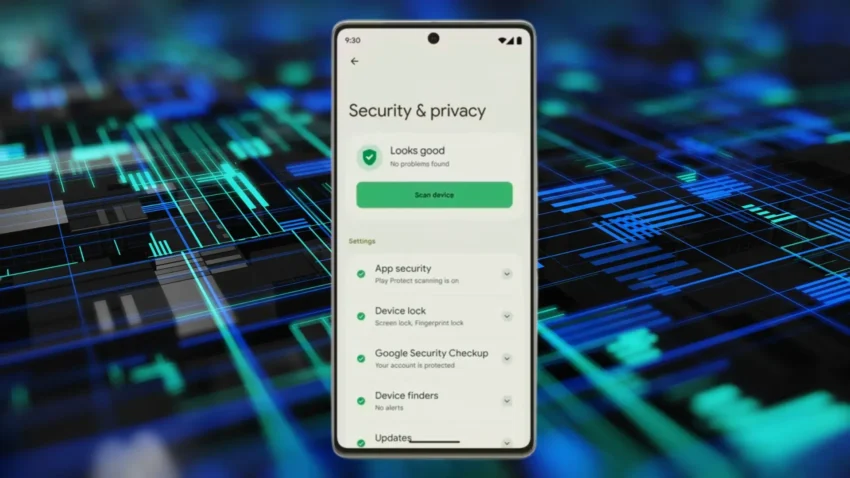Android app security is a paramount concern as millions of users depend on their mobile devices for personal and professional tasks. In 2024 alone, Google reported that it had blocked over 2.36 million Android apps from the Google Play Store due to policy violations, highlighting the ongoing battle against malicious apps. Collaborating closely with developers, Google has made significant strides in preventing unauthorized access to sensitive user data, ensuring app integrity across the platform. As threats like the Tria Stealer malware continue to emerge, users must be vigilant in choosing secure applications and consider utilizing verified VPN apps to enhance their online safety. With advanced features such as Google Play Protect and the introduction of a new “Verified” badge for trusted apps, the tech giant is committed to maintaining a secure environment for all Android users.
The security of applications on Android devices is crucial for safeguarding user data and maintaining trust in mobile technology. Recent statistics reveal that a significant number of potentially harmful apps have been prevented from entering the marketplace, underscoring the importance of app integrity. As threats evolve, such as those posed by the Tria Stealer malware, the necessity for effective security measures and the use of verified tools like VPN applications becomes even more evident. Google’s efforts, including the implementation of robust security features and collaboration with developers, reflect a proactive approach to combatting malicious software. By prioritizing app safety, users can confidently navigate their digital landscape, knowing that there are safeguards in place against risks.
Understanding Android App Security: A Continuous Challenge
Android app security is a paramount concern as the landscape of mobile applications evolves. With over 2.36 million apps blocked from the Google Play Store in 2024 alone, it is evident that malicious apps continue to pose significant threats to users. Google has taken proactive measures by banning more than 158,000 malicious developer accounts, highlighting the severity of the issue. The Google Play Protect feature plays a crucial role in identifying and flagging new threats, preventing approximately 13 million malicious apps from infiltrating users’ devices. This ongoing battle against malware underscores the importance of robust app integrity measures and the need for users to remain vigilant against potential risks associated with downloading applications from untrusted sources.
Moreover, the introduction of the Play Integrity API has allowed developers to verify if their apps have been tampered with or are running in compromised environments. This security measure has led to an 80% reduction in app usage from unverified sources, enhancing the overall security of Android apps. As malware strains, such as the Tria Stealer campaign, continuously emerge, it is critical for users to prioritize downloading apps that adhere to stringent security protocols. Understanding Android app security not only protects users from immediate threats but also contributes to a safer digital ecosystem for everyone.
The Role of Google Play Store in Securing Android Apps
The Google Play Store is the primary marketplace for Android applications, and its role in securing apps cannot be overstated. In 2024, Google implemented stringent policies that resulted in the blockage of millions of apps that violated safety protocols. This initiative is crucial in maintaining app integrity and ensuring that users do not fall victim to malicious apps that may compromise their personal data. By leveraging advanced security measures, Google aims to create a safer environment for users to explore and download apps, significantly reducing the risks associated with app installations.
The collaboration between Google and third-party developers has also been instrumental in enhancing the security of applications available on the Play Store. By preventing 1.3 million apps from accessing sensitive user data unnecessarily, Google demonstrates its commitment to user privacy. Additionally, the introduction of a ‘Verified’ badge for VPN apps underscores the importance of transparency in app security. This badge assists users in making informed decisions regarding the VPN applications they choose to use, fostering a sense of trust and confidence in the apps they download from the Google Play Store.
Combatting Malicious Apps: Insights on the Tria Stealer Campaign
The Tria Stealer campaign has emerged as a significant threat targeting Android users in Malaysia and Brunei. This malware, distributed through personal and group chats on platforms like Telegram and WhatsApp, highlights the evolving tactics used by cybercriminals to exploit users. By requesting sensitive permissions, Tria Stealer can harvest data from popular apps like Gmail and WhatsApp, posing severe risks to personal privacy and security. Understanding the mechanics of such malware campaigns is crucial for users to recognize potential threats and take necessary precautions.
Cybersecurity experts, such as Kaspersky, have noted that Tria Stealer not only collects SMS data but also tracks call logs and messages from various apps. This capability enables attackers to steal one-time passwords (OTPs), granting them access to sensitive online services, including banking accounts. The cyclical nature of these attacks, where stolen information is used to further distribute malware to victims’ contacts, exemplifies the need for robust security measures and user awareness. By staying informed about such campaigns, users can protect themselves from falling victim to sophisticated scams.
The Importance of VPN Apps in Android Security
VPN apps play a critical role in enhancing security and privacy for Android users, especially in the context of increasing threats from malicious apps. The introduction of a ‘Verified’ badge for consumer-facing VPN apps signifies a move towards promoting applications that have undergone rigorous security assessments. This initiative not only helps users make informed choices but also encourages developers to prioritize user safety in their app design. By utilizing VPN apps that have been verified, users can enhance their online privacy and reduce the risk of exposing sensitive information to cyber threats.
Moreover, VPNs can act as a safeguard against data interception by encrypting users’ internet traffic, making it more difficult for malicious actors to exploit vulnerabilities. As users rely more on mobile devices for daily activities, the importance of using secure applications, including VPNs, cannot be understated. The combination of a secure VPN with the protective measures offered by Google Play Store can significantly bolster Android app security, ultimately fostering a safer digital environment for all users.
User Awareness: A Key Component of Android App Security
User awareness is a pivotal aspect of maintaining Android app security. Despite the advanced security measures implemented by Google, users must remain vigilant when downloading applications. Familiarizing themselves with the permissions requested by apps and recognizing the signs of potential malware can empower users to make safer choices. Educating users about the risks associated with sideloading apps from unverified sources is essential, as this practice often leads to security breaches and data theft.
Additionally, users should be proactive in keeping their devices updated with the latest security patches and using features like Google Play Protect. This built-in security feature is designed to scan apps for malware threats and alert users to potential risks. By fostering a culture of awareness and encouraging safe practices, users can contribute significantly to the overall security of the Android ecosystem, thus reducing the impact of malicious apps and enhancing their own digital safety.
Collaborative Efforts in Enhancing Android Security
The collaborative efforts between Google and app developers play a vital role in enhancing Android security. By working together, they can identify vulnerabilities and implement solutions that protect users from harmful applications. Google’s initiatives, such as the Play Integrity API, allow developers to verify the authenticity of their apps and ensure they have not been maliciously altered. This collaborative approach has led to a notable reduction in the use of unverified apps, providing users with greater assurance in the integrity of the applications they download.
Furthermore, partnerships with cybersecurity firms and organizations enable Google to stay ahead of emerging threats. By sharing intelligence and resources, they can better defend against sophisticated malware campaigns, such as Tria Stealer. Such collaborations highlight the importance of a collective effort in combating cyber threats, emphasizing that security is not solely the responsibility of tech giants like Google but requires active participation from developers and users alike.
The Future of Android App Security: Trends and Innovations
As the landscape of mobile technology continues to evolve, so too do the strategies employed to secure Android applications. Trends in app security are increasingly leaning towards incorporating artificial intelligence and machine learning to detect and mitigate threats in real-time. These innovations have the potential to enhance the effectiveness of existing security measures, allowing for faster identification of malicious apps and more robust defense mechanisms against evolving malware strains.
Moreover, the continuous improvement of security protocols, such as the implementation of two-factor authentication and biometric verification, will play a significant role in the future of Android app security. Users can expect to see more applications adopting these features to protect sensitive data from unauthorized access. As new threats emerge, the focus will remain on developing adaptive security solutions that not only respond to current challenges but also anticipate future risks, ensuring a safer environment for Android users.
Best Practices for Downloading Safe Android Apps
To maximize security while downloading Android apps, users should adhere to best practices that help mitigate risks. First and foremost, always download apps exclusively from the Google Play Store, where security measures are implemented to screen for malicious content. Users should also pay attention to app reviews and ratings, as these can provide valuable insights into the app’s reputation and potential security issues. Implementing these practices can significantly reduce the chances of installing harmful applications.
Additionally, users should regularly review the permissions requested by apps before installation. If an app requests access to sensitive information that seems unnecessary for its functionality, it may be a red flag. Keeping the device’s operating system and apps updated with the latest security patches is also crucial in defending against known vulnerabilities. By following these best practices, users can better protect themselves from the threats posed by malicious apps and enhance their overall Android app security.
The Impact of Malware on User Privacy and Security
Malware poses a significant threat to user privacy and security, especially in the context of Android devices. With the increasing sophistication of malicious applications like Tria Stealer, users are at risk of having their personal information compromised. Such malware can extract sensitive data, including messages, call logs, and even banking credentials, leading to severe consequences for victims. Understanding the impact of malware is essential for users to recognize the importance of employing security measures and being cautious about the apps they choose to install.
The ramifications of malware extend beyond individual privacy breaches; they can also lead to widespread data theft and identity fraud. Cybercriminals utilize stolen information to exploit victims financially or manipulate their contacts. This cycle of exploitation emphasizes the urgent need for robust security measures within the Android ecosystem. By raising awareness of the potential consequences of malware and promoting safe app usage, users can contribute to a more secure digital landscape and protect their personal information from malicious actors.
Frequently Asked Questions
What measures does Google take to ensure Android app security on the Google Play Store?
Google implements stringent measures to enhance Android app security, including blocking over 2.36 million apps that violate policies in 2024. They also banned over 158,000 malicious developer accounts and prevented 1.3 million apps from accessing sensitive user data unnecessarily. Google Play Protect is another key feature that identifies threats, ensuring a safer experience for users.
How does the Play Integrity API improve Android app security?
The Play Integrity API is a vital tool for enhancing Android app security. It allows developers to verify if their apps have been altered or are running in compromised environments. This feature has led to an 80% reduction in app usage from unverified sources, ensuring users are protected from malicious apps.
What is the role of Google Play Protect in Android app security?
Google Play Protect plays a crucial role in Android app security by automatically scanning apps for harmful behavior and flagging new threats. This feature is enabled by default on Android devices, identifying around 13 million malicious apps outside the Google Play Store, thus safeguarding users from potential risks.
What should users know about the new ‘Verified’ badge for VPN apps?
The ‘Verified’ badge for VPN apps, introduced in 2023, indicates that these apps have passed a Mobile Application Security Assessment (MASA) audit. This badge helps users make informed decisions about the VPN apps they choose, prioritizing their privacy and security while enhancing trust in the applications downloaded from the Google Play Store.
How can users protect themselves from malicious apps like Tria Stealer on Android?
To protect against malicious apps like Tria Stealer, users should only download apps from the Google Play Store and ensure they have Google Play Protect enabled. Additionally, avoiding APK files from untrusted sources, examining app permissions carefully, and keeping the device updated can help mitigate the risk of malware infections.
What are the risks associated with sideloading apps on Android devices?
Sideloading apps on Android devices can expose users to significant risks, including the installation of malicious apps. Google has taken steps to block such practices in various markets, protecting millions of devices from risky installation attempts and ensuring that users are safeguarded from potential threats.
What types of data can the Tria Stealer malware access on Android devices?
Tria Stealer is designed to access a wide range of sensitive information from Android devices, including SMS data, call logs, and messages from apps like WhatsApp and Microsoft Outlook. It can also target email accounts, potentially allowing attackers to hijack personal messaging accounts.
Why is it important to monitor app permissions for Android apps?
Monitoring app permissions is critical for Android app security because excessive or unnecessary permissions can lead to data breaches. Users should be cautious and only grant permissions that are essential for the app’s functionality, which helps protect personal information from malicious apps.
How has Google responded to the increasing threat of malware targeting Android users?
In response to the growing threat of malware, including campaigns like Tria Stealer, Google has strengthened its app security measures by blocking millions of malicious apps, enhancing the Play Integrity API, and increasing collaboration with developers to ensure that users have a safer experience on the Google Play Store.
What steps can developers take to maintain Android app security?
Developers can maintain Android app security by utilizing the Play Integrity API to verify app integrity, adhering to Google’s security policies, and conducting regular security audits. They should also ensure that their apps request only necessary permissions and remain updated with the latest security practices to protect users.
| Key Point | Detail |
|---|---|
| Blocked Apps | Google blocked over 2.36 million Android apps for policy violations in 2024. |
| Malicious Developer Accounts | Banned more than 158,000 malicious developer accounts. |
| Sensitive Data Protection | Prevented 1.3 million apps from accessing sensitive user data. |
| Google Play Protect | Identified 13 million new malicious apps outside Google Play. |
| App Security Enhancements | 91% of app installs on Google Play Store use protections from Android 13 or newer. |
| Play Integrity API Usage | 80% reduction in app usage from unverified sources. |
| Sideloading Prevention | Blocked 36 million risky installation attempts in various countries. |
| Verified Badge for VPNs | Introduced a “Verified” badge for secure consumer-facing VPN apps. |
| Tria Stealer Campaign | Targets Android users, harvesting sensitive data via malicious apps. |
Summary
Android app security is paramount in today’s digital landscape, as evidenced by Google’s proactive measures in 2024. The company successfully blocked millions of harmful apps and malicious developer accounts, reinforcing its commitment to protecting user data. With the introduction of features like Google Play Protect and the Play Integrity API, Google continues to enhance the safety of the Android ecosystem. However, ongoing threats such as the Tria Stealer malware highlight the need for continuous vigilance and improvement in app security practices.






